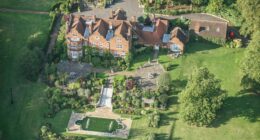
There will be low-altitude buzzing.
One or two Beechcraft King Air turboprop planes will start spraying mosquitoes across most of Flagler County at very low altitude–just 300 feet–starting Nov. 2, to reduce the multiplying population of mosquitoes in the aftermath of Hurricane Milton. The spraying is paid for with state emergency funds and the planes are contracted through the state rather than through the East Flagler Mosquito Control District.
The spraying–or bombing, if you prefer–will likely begin the evening of Saturday and go from dusk to dawn. It’ll continue each night until dawn on Wednesday, November 6. The planes will make considerable noise. “There may actually be several plane in the area,” Maerk Positano, the district’s director, said. “They may star with one plane and have two spraying at one time, but usually not more than two.”
Pesticides for mosquito control are applied at “ultra-low volume” with rates of less than an ounce per acre. The pesticides are the same used by the local district. Positano estimates the value of the pesticides to be used by the state in the half million dollar range. Mosquitoes are most active at night, when pollinators and other beneficial insects are less active and therefore avoid exposure. The active ingredients break down quickly and do not have any residual effects, officials say. Nevertheless, beekeepers will be notified by the UF|IFAS Flagler Extension Office.
Flagler County Emergency Management works with the mosquito district and the Florida Department of Health to determine if broader spraying was needed, Lord said, relying on the district’s traps, which measure the mosquito population at numerous sites in the county. “We then make an official request like we do for any kind of hurricane emergency request to the state,” Lord said. “We were actually one of the first counties to request it.”
The state asks a few questions, such as what areas to avoid–organic farms, for example–then works with the local mosquito district to develop the messaging before launching the planes.
The state conducted similar spraying in Flagler following hurricanes Irma, Nicole and Ian. Larger unpopulated natural areas will be excluded from spraying.
The mosquito spraying schedule is contingent on the weather and availability of the state’s contracted planes upon completion of existing missions, as well as other unforeseen delays.
The East Flagler district sprayed by helicopter and truck last week, getting mosquito populations down to a reasonable level. “The planes will come in and finish it off,” he said, especially in areas where the district could not go.






